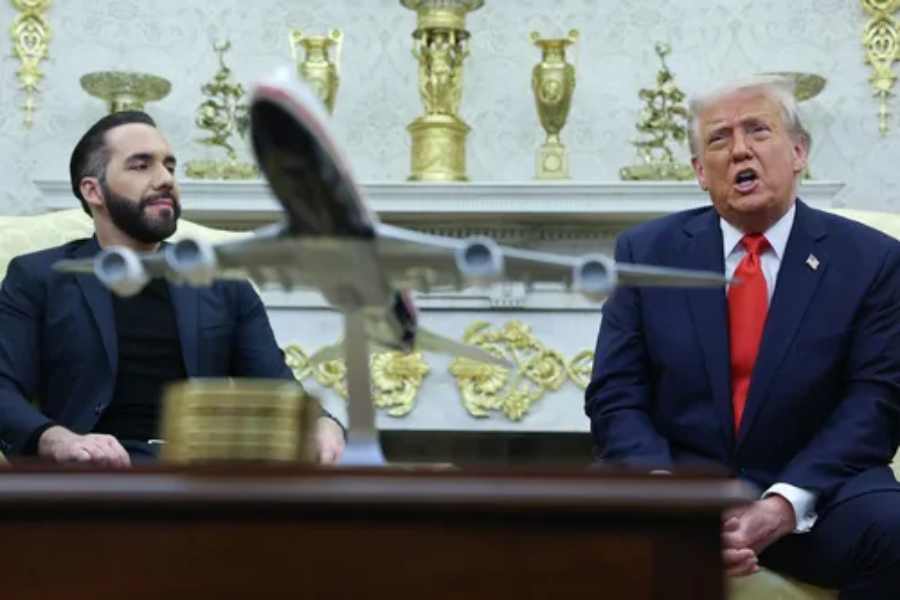In a stunning and highly controversial move, former President Donald Trump suggested during a White House meeting that violent U.S.-born criminals should be sent to El Salvador for incarceration. The idea was floated in an Oval Office discussion with Salvadoran President Nayib Bukele and was caught on a livestream before journalists entered the room.
“Homegrown are next,” Trump said directly to Bukele, referring to U.S. citizens who commit violent crimes. “You’ve got to build about five more places,” he added, referencing the need for more prison facilities in El Salvador. Bukele replied without hesitation, “Yeah, we’ve got space,” prompting laughter from others in the room. “It’s not big enough,” Trump said in response.
Trump has already coordinated with El Salvador to deport non-citizen gang suspects and house them in the country’s notorious prison, CECOT — the Terrorism Confinement Center — one of the largest and most controversial prisons in the world. More than 270 men, accused of being members of violent gangs like MS-13 and Tren de Aragua, have already been sent there.
Among them is Kilmar Abrego Garcia, a Maryland-based father and sheet metal worker, who a federal court later ruled had been wrongfully deported. Despite a U.S. Supreme Court order demanding his return, Bukele has refused to release him, claiming Garcia was in the country illegally.
During a press conference later that day, Trump reiterated his position and expanded on the types of criminals he believes should be removed from the country. “We always have to obey the laws,” he said. “But we also have homegrown criminals that push people into subways, that hit elderly ladies on the back of the head with a baseball bat when they’re not looking — that are absolute monsters.”
He expressed a desire to include these individuals in future deportation plans, addressing his senior adviser Stephen Miller directly. “I’d like to include them in the group… but you’ll have to be looking at the laws on that, Steve.”
Trump noted that former Florida Attorney General Pam Bondi is currently reviewing the legal feasibility of his proposal. “We’re studying the laws right now. Pam is studying if we can do that. And I’m talking about violent people. I’m talking about really bad people,” Trump said.
Legal experts were quick to respond, pointing out that the proposal would likely be unconstitutional. “There is absolutely no legal mechanism for the U.S. government to deport and incarcerate its own citizens in another country,” said constitutional law scholar Michael Waldman. “It violates due process and protections under the Constitution.”
Human rights organizations echoed this sentiment. “This is beyond extreme,” said Maria Gonzalez, an attorney for the ACLU. “It’s an idea rooted in authoritarianism. U.S. citizens are entitled to constitutional protections, even if they’ve committed serious crimes.”
President Bukele, known for his hardline policies and praised by some conservatives for his crackdown on crime, seemed more than willing to accommodate Trump’s wishes. “Mr. President, you have 350 million people to liberate,” Bukele said. “But to liberate 350 million people, you have to imprison some.”
Bukele’s massive prison complex, CECOT, has faced global criticism for its harsh conditions, alleged mistreatment of prisoners, and lack of transparency. Despite this, Trump sees it as a viable model. The prison currently houses thousands of inmates, often under highly restrictive conditions and without access to lawyers or trials.
The notion of forming a prison partnership between the U.S. and El Salvador — especially one involving the incarceration of U.S.-born citizens — has raised alarms across political lines. Many see it as a dangerous escalation of Trump’s already aggressive stance on crime and immigration.
While it remains unclear whether this idea will ever become formal policy, it has already sparked widespread debate. Supporters argue that it reflects Trump’s commitment to public safety, while opponents call it a blatant abuse of power and a step toward eroding civil liberties.
So far, the Department of Justice has not made any public comments on the legality of the idea. Insiders say Bondi’s review is in its early stages and that there’s no clear timeline for any legal proposal.
As Trump gears up for another potential run at the presidency, this proposal might signal how far he’s willing to go to push the boundaries of executive authority. While the suggestion may resonate with some of his base, it is likely to face significant legal challenges, public backlash, and international scrutiny.
Trump’s latest statement — “If it’s a homegrown criminal, I have no problem” — may be remembered not just as political posturing, but as a potential flashpoint in the evolving battle over justice, citizenship, and civil rights in America.

